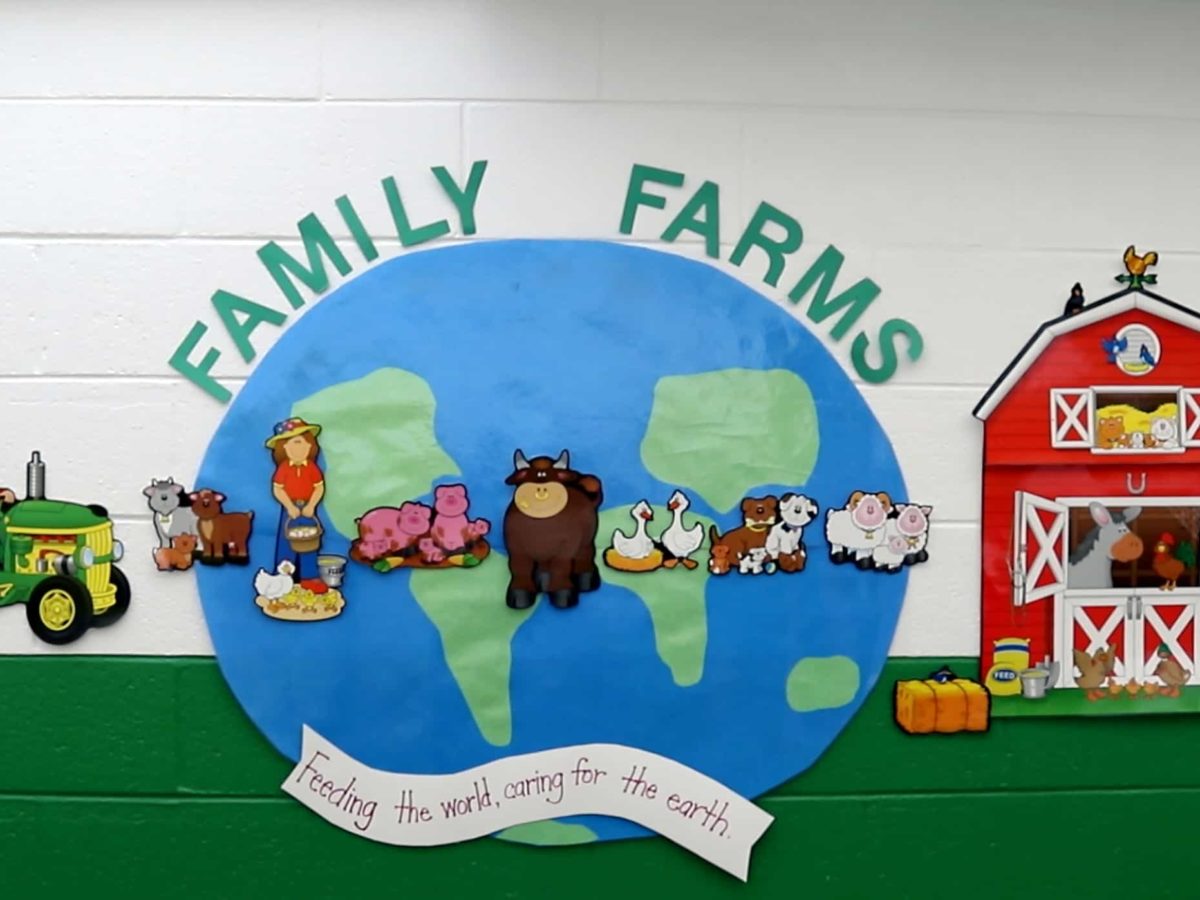

With the growing push for STEM learning and obvious need for STEM careers within and around the country, agriculture is a key to unlocking the possibilities for students to find excitement in the world of science, technology, engineering, and math. Agriculture opens up the door to innovative learning while making subject content relevant and important to the growing society.
Teaching is a lot like farming. Farming is probably the only profession that connects a person with the land from start to finish. Many people may believe farming to be easy, just as some view teaching to be, but farming is not easy. You can’t just go to a field, plant a seed, and expect an outstanding crop. Preparations must be made, the field must be limed, the ground must be plowed or tilled until the surface is ready to plant the seeds. Timing has to be perfect so that the roots are grounded to withstand harsh conditions. Once the seed is planted, it then has to be cared for and tended or else it will not grow to its full potential, much like the growth of a learning child. Nothing about either of these professions is easy, yet they can be the most rewarding of careers.
Just as a farmer would tell you, the easy part is planting the seed. In teaching, the easy part is planting the seed for learning. Any teacher is capable of planting knowledge, but the seed cannot just be planted. Young minds have to be cared for. The students have to be prepared for learning and given the best environment for academic growth. Then the real work begins – cultivating student learning through teaching.
As teachers, we have to care for our students, and when growth slows down, we have to help them make it through. Once they are grown, we don’t just let their knowledge die, we harvest that knowledge and use it for the greater good continuing their success in education. Farming never stops giving – just as teaching and learning never stop giving.
It is easy to see my obvious love for agriculture, but what you cannot see is the student that was once a behavior child learn to work with others to participate in farming activities in the classroom, or the student that never felt they were good at anything find a passion for growing vegetables and even take the knowledge of things they learned at school to start a garden of their own at home. Obviously, this is nothing new, and hundreds of teachers before me – and many now – utilize this method of teaching in their own classrooms today, but sometimes we get so caught up in the technology world, we forget what we are actually capable of as educators.
So what does this mean for me?
Utilizing agriculture as a context for teaching and learning opens a new world of learning for students, not only for students in the metro areas but those in the rural areas too. With less than 2 percent of the nation directly connected to the farm, there has never been a time that teaching our younger generations about the importance of agriculture has had more significance. In the era of STEM and the reinvention of hands-on learning, I truly believe that unlocking a passion for agriculture in and around the classroom is the key to sustaining innovative learning.
There is something about allowing a student to “grow” in their own learning that takes teaching to a whole new level. Imagine the smiles and reactions a student gives when they see the tiny seed they planted then sprout into a green stem and produce something that can be used to feed others. The moments are priceless and the learning that comes from these experiences are unmatched by any.
In promoting a new innovation I created within my own county – with the help of North Carolina Farm Bureau’s Ag in the Classroom – our elementary schools have reached hundreds of children through experiences in agriculture. Through research gathered during the process of creating the “Dig into Learning” innovation, I found that teachers had favorable feelings and reactions to integrating agriculture into their classrooms, with the majority stating they would use it in their classrooms if given the materials to do so.
Farmer’s wife, teacher life
In conducting my research, I utilized a program evaluation in which I evaluated the effectiveness of the implementation of the program Dig into Learning. This allowed me to see what parts of the program were helpful to teachers who willingly integrated agricultural concepts into their daily lessons. Additionally, I was able to interview some of them to find out how it impacted their teaching style and the impact it had on their students. From their comments collected from surveys and interviews, I have compiled a list of top ten comments to help others integrate not only agriculture but other concepts that benefit the 21st-century learner.
Steps to integrating your passion
- You have to be willing to get dirty
- Your students will challenge you, your heart will become heavy at times – but some of the toughest moments bring the greatest rewards
- You have to have a vision
- Every person has a vision of what their hopes are before they begin something, whether it be the crop the farmer has chosen to plant or the career path a student has chosen to pursue. I love Stephen Covey’s quote, “Begin with the end in mind.”
- You have to be willing to plant the seed
- Taking that first step is sometimes the hardest part, especially if it is something we have never done.
- North Carolina Farm Bureau’s Ag in the Classroom offers tons of resources to help teachers get prepared for creating agriculturally literate students. Without their help, I would never have had some of the amazing opportunities to integrate agriculture into my classroom.
- You have to be patient
- Patience is a virtue that sometimes is the hardest thing for anyone to do – but in patience you find your own wisdom. Sometimes things we have to wait for the longest are worth the wait – kind of like a farmer waiting on a harvest.
- You have to learn to deal with things out of your control.
- Farmers cannot control the weather just as teachers cannot control the ability or lack of ability of their students, however, both farmers and teachers can work with what they have and make something beautiful out of even the unlikeliest situations.
- You have to be willing to work hard
- Hard work is a value that, in my opinion, has taken the back burner in our world today. Our country has the mindset of “do the least and get the most” instead of the golden rule of “Give it all You’ve Got.” Everyone, whether it’s the farmer working 20-hour days getting those crops in on rainless days or the teacher writing lesson plans and collecting work that best fits the needs of all their students, hard work pays off. We just have to remember “Give it all You’ve Got,” and rewards you will receive.
- You cannot do it alone
- I never understood the phrase, “It takes an army to raise a child.” I get it now. Children need support – at home, at school, from family, from friends, you name it, they need it. The sad truth is, in today’s society, there are a lot of children that do not receive the support they need. I can say the same for farmers in our country. Without farmers, we have no food, and without brilliant young minds, we have no leaders for tomorrow. Support your children – they are our future.
- You have to be thankful
- My daddy is a farmer and all I can remember him saying even during the bad crop years is, “I am thankful.” Thankful? I would think. “Yes, thankful. Thankful that I was allowed to do something I love for one more year.” As teachers we must be thankful – no matter how deep our load gets or how little we hear the words “thank you.” We have to be thankful – thankful that we were given the opportunity to make a difference – not only in a child’s life, but in the lives that will one day change the world.
- Sometimes you have to let go
- There are those times when nothing you do seems to matter, and we will all have those cases when we are close to giving up on the defiant child who refuses to do work, or the chronically late student who thinks their lives are more important than yours, you name it. Sometimes instead of retaliation, we just have to “Let it Go.” Things have a way of working themselves out.
- It’s all about love
- To be successful, you have to love what you do. Farmers give it their all because farming is their passion. Teaching is just that way. As a teacher you have to love – love the unlovable, love those with, love those without, love those who can, love those who can’t…You have to love no matter what the circumstance. That is one thing that makes teachers great – their love is unconditional.
I think by now it is obvious that my heart is deeply rooted in the world of education, but also the world of agriculture and farming. Fortunately, I have had the opportunity of combing my loves into one. I spend most of my days integrating agriculture into my everyday teaching. Of course, none of this would be possible without the support I have received from organizations such as North Carolina Farm Bureau (NCFB) and NCFB Ag in the Classroom. Creating a culture that supports agriculture is very important to me, but it is also very important to bring the most innovative ways of learning to my students, offering the best possible learning experience that I can provide. By integrating agriculture into the everyday classroom of schools across the state and the nation, it can impact the way students feel about agriculture and about farming. It can create a positive, life-changing experience to teach students about the relationship between people and the world of agriculture, helping students understand the many careers that are directly related to agriculture.
So get out there and get dirty planting and growing the lives of young minds.




